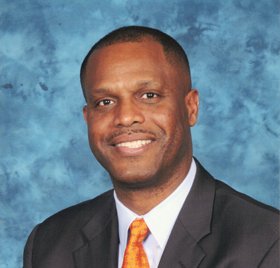Richmond schools seek money to fulfill needs
Joey Matthews | 2/4/2015, 4:17 p.m.
Lucille M. Brown Middle School is facing a serious communications problem.
The South Side school has not had a working intercom system since December.
In the meantime, the school, led by Principal Jonathan Morris, has instituted measures for schoolwide communications should an emergency arise, equipping administrators and school security with megaphones, two- way radios and other means to interact with one another.
The Richmond School Board approved a $72,000 appropriation at its Jan. 19 meeting to install a new intercom system, but replacement work has not begun.
In other developments, 10 new buses acquired by Richmond Public Schools in a lease-to-own agreement signed last summer “have been wrecked,” Thomas Kranz, assistant superintendent of support services, told the board.
“Some were our fault; some were not our fault,” he later told the Free Press.
Mr. Kranz said one bus did not make it out of the bus parking lot before it was wrecked. That drew laughter from some audience members attending the board meeting.
Mr. Kranz said the wrecked buses have been repaired and are back on the road.
He said three more of the lease-to-own buses are in use for RPS, bringing the total to 63 now on the road. He said he expects the remaining 15 to arrive soon after they pass two rounds of inspections.
The announcement of the broken intercom system and bus crashes came on the same night Schools Superintendent Dana T. Bedden presented his “Estimate of Needs” financial wish list to the School Board. It was designed to fuel the academic improvement plan he introduced a week earlier.
In a dramatic move, he has proposed that the city increase its contribution to public education by an unprecedented 22 percent to fuel a turnaround in learning — an increase that would amount to $30 million in fiscal year 2016, which begins July 1.
Should that increase be approved, the city’s contribution for public education would increase from a projected $136 million to $166 million in the upcoming fiscal year. That would raise the city’s investment in Richmond’s 23,000-plus students from about $6,100 per pupil by about $1,350 to $7,450 per pupil.
Mayor Dwight C. Jones, who is expected to present his proposed two-year budget March 6, already has indicated to the board that he does not believe the city can afford to provide an extra $30 million for public education.
The $30 million would equal the money the city spends to operate the public libraries and its public parks and recreation centers, provide a 9-1-1 call center and support the city’s health district.
Still, should Dr. Bedden get his way, he would be able to undertake what he told the board was an “aggressive and bold plan” to improve student learning. His proposal calls for spending the lion’s share of new funds on personnel, including hiring 125 new people to beef up instruction and to pay teachers for working an additional nine days to improve professional development, a cornerstone of Dr. Bedden’s efforts to expand academic achievement.
The proposed new additions to the teaching corps would include 17 elementary teachers to begin reducing class sizes in kindergarten through third grade and 11 employees to serve the growing Latino student population. He also wants to hire 13 additional reading and math specialists to boost learning in those key areas and secure eight more exceptional education teachers to serve mentally challenged students.
New hires also would go to staff the revamped Binford Middle School, which the School Board proposes to transform into a combination middle school where students would receive instruction in fine arts and additional help through specialty reading and math programs designed to better prepare them for the rigors of college.
He also wants to use some of the money to pay for a 1.7 percent cost-of-living pay increase for teachers and other employees.
The personnel actions would cost $16 million, Dr. Bedden said. Another $12 million would be poured into upgrading technology, improving maintenance and meeting other school system needs.
Ralph Westbay, the assistant superintendent for financial services, separately outlined Dr. Bedden’s request to the city for $35 million to replace heating and cooling systems and take care of other critical needs in aging buildings. That new money would be separate from the request for the $30 million boost in the city’s contribution to operations.
Jeffrey M. Bourne, 3rd District, called the superintendent’s operational spending plan a realistic proposal to upgrade the district’s schools “to where we want to be.”
Other board members, including Kimberly B. “Kim” Gray, 2nd District, and Glen Sturtevant, 1st District, voiced support for the plan, but stressed approved funds must be spent wisely to enable the city to justify the additional spending to taxpayers.
Dr. Bedden said his proposal is designed to start the conversation between the board, City Council and Mayor Jones on how much the city would provide to better educate the district’s students, including about 1,700 children in pre-K classes that are financed separately.
The superintendent told the Free Press that he hopes the mayor and council will approve his budget plan, but realizes that in the end, the school system might not get what he believes it needs.
The board scheduled a public hearing on the budget for Monday, Feb. 2, at City Hall at its regular meeting, and also has work sessions scheduled for Feb. 5 and Feb. 12 to discuss the budget.
Dr. Bedden said the upcoming talks would allow the board and his leadership team to determine “what do we want to keep and what do we want to jettison” before the board approves and sends a budget proposal to the city.





